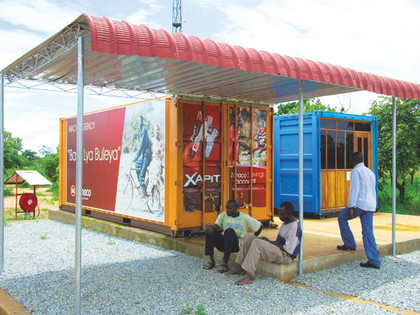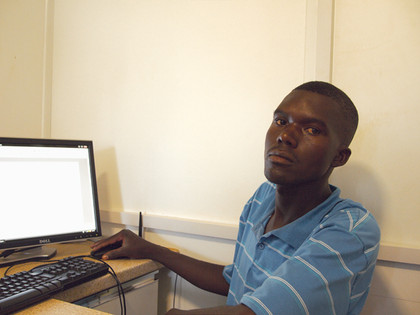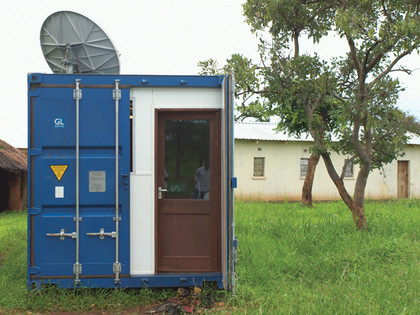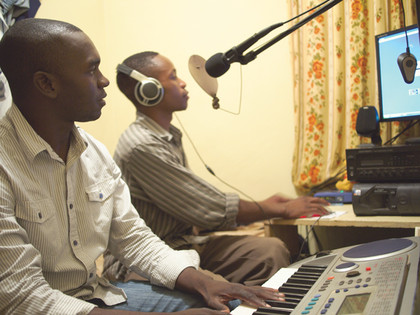How Linux is changing lives in Zambia
Helping a small village to connect and communicate
Sign up for breaking news, reviews, opinion, top tech deals, and more.
You are now subscribed
Your newsletter sign-up was successful

Standing outside one of LinkNet's more remote installations, in Chikanta, Munguya explains how knowledge can be transformative.
"Before the internet, buyers of crop surpluses would take advantage of people's ignorance," he says, "by paying far below the market price for a bag of grain. Now, farmers have learned to check prices online, and they don't get ripped off."
One of the most important benefits is research: several farms are introducing cash crops, such as peanuts and soya, alongside their maize staples in order to raise money. MachaWorks has experimented with growing the oil-rich plant Jatropha for fuels, in order to try to reduce its reliance on donors.

Another key aim is to create relatively high-tech jobs that encourage young people to stay in the villages rather than move to Lusaka. "There are more IT apprenticeships available here in Macha now than in the urban areas," Munguya says.
To a Linux advocate, the principles that guide MachaWorks and LinkNet will sound uncannily familiar. Putting people in control of the solutions offered to them, sharing knowledge among a large community for the benefit of all, promoting open innovation… there's a lot of overlap between the vision of grassroots development agencies such as Macha and the goals of open source.
Tony Roberts co-founded the charity Computer Aid International, and has been involved with MachaWorks for several years. Although he left Computer Aid in 2010 to study for a PhD in IT and Development, he remains close to the Zambian project and visits regularly.
"Agency freedom and participation are key to good development practice," Roberts explains. "Open source enables greater freedom for communities to produce software in their own language, tailored to cultural settings and self-determined needs."
Sign up for breaking news, reviews, opinion, top tech deals, and more.
Linux isn't used exclusively around MachaWorks, though. The syllabus at LITA is built around the International Computer Driving Licence, which is a Windows-based course, because there are no equivalent certificates that can help graduates find work using Linux.
Some of the cybercafes use Windows machines, too, including one provided by Computer Aid. In this case, using Windows helped reduce costs by networking 11 thin clients to one server.
Pragmatism, not evangelism

Hitesh Chauhan, Computer Aid's IT manager, says that the company encourages projects that it supports to use open source software, but isn't prescriptive of it.
"We use open source software extensively in both our production departments and our own back-end systems, and offer it as an alternative to propriety solutions, such as Microsoft Windows," says Chauhan, "Computer Aid has experience in implementing open source solutions and encourages its use and benefits. Where a recipient requests Microsoft Windows, we will also install open source alternatives such as Firefox, Google Chrome, Libre Office, Gimp, Audacity etc. We utilise Ubuntu as our primary distro, though we do keep tabs on other distros."
In development work, any project - IT-related or otherwise - that doesn't put people first is in danger of failing. Wayan Vota, a prominent ITC4D practitioner (ITC for Development), who blogs at ICTWorks.org, says that while open solutions are often best, it's important not to put philosophical arguments above the actual problem being addressed.
"Fundamentalism is the number one reason that folks get turned off from FLOSS," Vota explains. "Too many in the FLOSS community get so tied up in the philosophy of open source that they forget the practicalities of deployment. The best ICT interventions use the best software, regardless of its code base. In some cases that's FLOSS, in others its not - and both should be acceptable, and applied equally."
Given that PC sales are being held up by huge growth in countries where the cost of proprietary software would seem prohibitive, such as India and China, it might seem odd that there's been no significant change in the global proportion of desktop users running Linux.
"FLOSS is growing in popularity, but I'm not sure if it's increasing in scale greater than the general increase in ICT usage," Vota says, "I have the feeling - but no hard data - that it's growing at about the same rate as ICT usage overall, with the exception of Android, which is growing quite quickly in the mobile space."
While it may not be to every LXF reader's taste, Munguya is a fan of Unity, the new Ubuntu front end. He's just finished upgrading LinkNet to version 11.04 and says that the speed with which people who've never used computers pick up Unity is quicker than the old Gnome 2.x.
"I think the challenge people have faced in the past with Ubuntu is 'where do I find what I'm looking for?'" he explains, "With the new version, people don't need to go far - if they want to open Libre Office, it's one of the icons on the desktop."
Jono Bacon, Ubuntu's community manager, says that while Unity wasn't necessarily designed with development work in mind, increasing accessibility will always be part of Ubuntu's core values.
"Ubuntu's singular mission isn't focused specifically on supporting people in developing nations, but it is part of its remit." Bacon says, "So there's a set of core values - that it will always be free, there will always be one version, that it will always be in your language and accessible. These principles help to guide the project forward so they can benefit people in Zambia as much as San Francisco."

Munguya lives in a small dormitory with other MachaWorks employees near the organisation's HQ. After he finishes work, he can often be found indulging in his other big IT passion. Using equipment borrowed from the radio station and local church, he's slowly creating a digital archive of Zambian folk and gospel music.
Munguya believes that although the introduction of technology will inevitably change local culture and tastes, it can also be used to preserve it. In a country with more than 70 spoken languages, and even more traditions, that could be the task of a lifetime.
"I collect the sound of traditional music," he explains, "And I'm learning more about the different cultures. I need some things, like a condenser mic, studio sound card and mixer for a proper studio, but the project is coming on very well. For my computer studio, I still use Windows software, like Fruity Loops and Cubase, but I'm learning Ubuntu software, like Rosegarden, too."